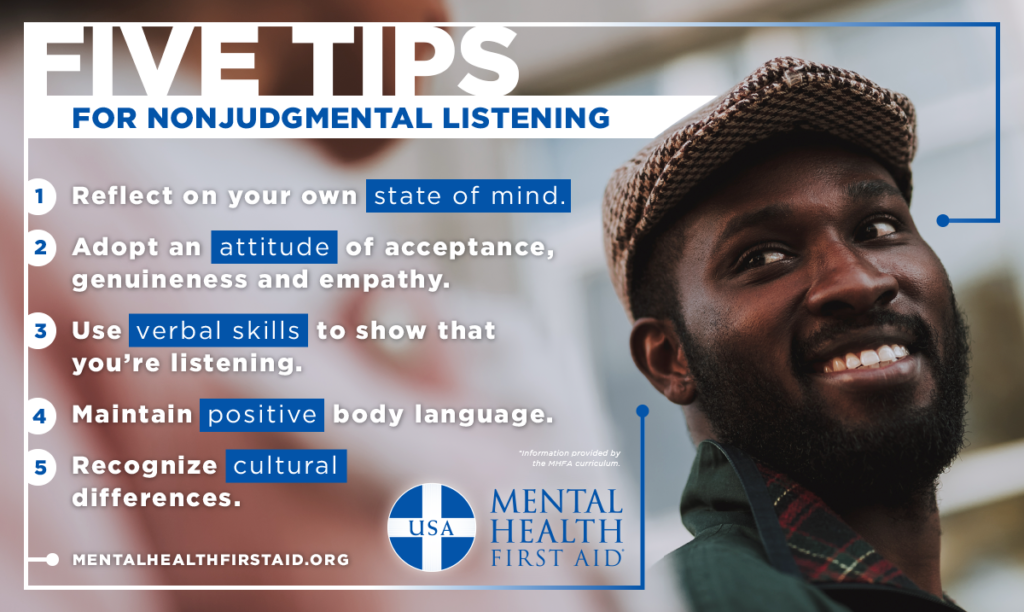Nonjudgmental listening cycle involves active listening, empathy, and understanding without imposing personal judgments. In today’s fast-paced world, effective communication skills are essential to foster meaningful relationships and resolve conflicts.
Nonjudgmental listening allows individuals to feel heard, validated, and respected, promoting a safe and supportive environment for open dialogue. This cycle begins by attentively listening to the speaker, focusing on their words, body language, and emotions. Empathy plays a crucial role, as it enables individuals to connect with others on a deeper level, putting aside personal biases and experiences.
By suspending judgment and showing genuine interest, nonjudgmental listening promotes positive communication, builds trust, and strengthens relationships.

Credit: www.mentalhealthfirstaid.org
The Importance Of Nonjudgmental Listening
Discover the significance of nonjudgmental listening in fostering open communication and building trust within relationships. Engaging in a continuous cycle of attentive and unbiased listening allows for deeper understanding and empathy in conversations. This practice promotes an environment where individuals feel heard and valued.
Building Trust And Connection
Building trust and connection is a fundamental aspect of nonjudgmental listening. When someone feels that they are being listened to without judgment, they are more likely to open up and share their thoughts, feelings, and experiences. This creates a sense of trust and connection between the listener and the speaker, fostering a safe and supportive environment. It allows the speaker to feel validated, understood, and accepted, which can have a profound impact on their emotional well-being.
Empowering The Speaker
Nonjudgmental listening is not just about hearing what someone is saying; it is about empowering the speaker to express themselves freely. By listening without judgment, the listener allows the speaker to explore their thoughts and feelings without fear of criticism or rejection. This empowers the speaker to be more authentic and vulnerable, leading to a deeper level of self-awareness and personal growth. It also encourages the speaker to take ownership of their own thoughts and emotions, as they feel safe to express themselves without the fear of judgment.

Credit: www.amazon.com
Key Elements Of Nonjudgmental Listening
Nonjudgmental Listening Cycle is a crucial skill that promotes open communication and fosters trust and understanding in interpersonal relationships. This type of active listening involves receiving and understanding messages without passing judgment or criticism. The key elements of nonjudgmental listening include active listening skills and the use of body language and verbal cues to convey empathy and understanding.
Active Listening Skills
Active listening involves fully concentrating, understanding, responding, and remembering what is being said. This skill requires the listener to focus on the speaker, to avoid interrupting, and to provide feedback that reflects a clear understanding of the message being communicated. It also involves asking open-ended questions to encourage the speaker to share more and elaborate on their thoughts and feelings.
Body Language And Verbal Cues
Body language and verbal cues play a significant role in nonjudgmental listening. By maintaining eye contact, nodding, and using encouraging verbal cues such as “I see” or “Tell me more,” the listener can convey empathy and interest in the speaker’s words. Additionally, mirroring the speaker’s body language can create a sense of connection and understanding, further enhancing the nonjudgmental listening experience.
Benefits Of Mastering Empathy
Mastering empathy fosters a nurturing environment through nonjudgmental listening. The cycle enables deeper connections, enhances understanding, and promotes effective communication in all interactions. Empathy skills are invaluable for building relationships and fostering collaboration in both personal and professional settings.
Benefits of Mastering Empathy
Empathy is a powerful tool that can significantly impact our interactions and relationships with others. By mastering empathy, we can unlock a host of benefits that enhance communication and foster stronger connections. Let’s delve into the advantages of embracing empathy and how it can positively transform our interactions and relationships.
Enhanced Communication
Empathy plays a pivotal role in enhancing communication. When we actively listen with empathy, we demonstrate a keen understanding of the speaker’s emotions and perspectives. This fosters an open and supportive environment where individuals feel heard and valued, leading to more meaningful and productive conversations.
Improved Relationships
One of the most profound benefits of mastering empathy is the improvement in relationships. By genuinely understanding and acknowledging others’ emotions and experiences, we can build trust, strengthen connections, and cultivate deeper, more authentic relationships. This can lead to a more harmonious and empathetic community.
In essence, mastering empathy paves the way for more meaningful and fulfilling interactions, creating a positive impact on both personal and professional relationships. As we continue to explore the profound impact of empathy, let’s delve deeper into the intricacies of the nonjudgmental listening cycle.
By mastering the nonjudgmental listening cycle, individuals can enhance their ability to understand and empathize with others, leading to a multitude of benefits such as improved communication and stronger relationships. Embracing empathy is not only a transformative personal skill but also a cornerstone for building a more compassionate and understanding society.

Credit: www.amazon.com
Barriers To Nonjudgmental Listening
Nonjudgmental listening is a crucial skill that helps us foster understanding and empathy in our relationships. However, there are several barriers that can impede our ability to engage in nonjudgmental listening. By being aware of these barriers, we can work towards overcoming them and becoming better listeners. In this section, we will explore two common barriers to nonjudgmental listening: personal biases and preconceived notions.
Personal Biases
Personal biases can greatly hinder our ability to truly listen and understand others without judgment. These biases are influenced by our own experiences, beliefs, and values, and can cloud our perception of what others are trying to communicate. It’s important to recognize that our biases exist and actively work on setting them aside when engaged in a listening conversation.
Here are some common personal biases to be aware of:
- Confirmation bias: the tendency to seek out information that aligns with our existing beliefs and ignore or dismiss information that challenges them.
- Stereotyping: the generalization of a certain group of people based on preconceived notions or assumptions.
- Halo effect: the tendency to attribute positive qualities to someone based on a single positive characteristic or action.
Preconceived Notions
Preconceived notions can also act as barriers to nonjudgmental listening. These notions are formed based on our previous experiences, cultural influences, and societal norms, and can prevent us from being open and accepting of different perspectives. To engage in nonjudgmental listening, it’s important to challenge and question our preconceived notions.
Here are some strategies to overcome preconceived notions:
- Practice empathy: Put yourself in the other person’s shoes and try to understand their viewpoint.
- Seek out diverse perspectives: Expose yourself to different cultures, opinions, and experiences to broaden your understanding.
- Stay curious: Approach conversations with a genuine desire to learn and explore new ideas.
By being aware of our personal biases and preconceived notions, we can create a space for nonjudgmental listening and foster deeper connections with others.
Developing Empathy Through Practice
Develop empathy by practicing the nonjudgmental listening cycle. Through active and compassionate listening, individuals can cultivate understanding and connect on a deeper level.
Developing empathy is vital for effective communication. Engaging in role-playing scenarios helps hone this skill.
Role-playing Scenarios
Practice empathy by engaging in role-playing exercises. Put yourself in others’ shoes to understand their perspectives.
Seeking Feedback
Feedback is crucial to improve empathy skills. Seek insights from others to enhance understanding and connection.
Application In Different Settings
Workplace
Nonjudgmental listening in the workplace fosters trust and boosts productivity.
Managers who practice this communication style can resolve conflicts effectively.
Personal Relationships
In personal relationships, nonjudgmental listening strengthens emotional bonds.
Partners who engage in this form of communication experience deeper connections.
Overcoming Challenges In Understanding
Cultural Differences
Nonjudgmental listening can be particularly challenging when there are cultural differences at play. Each culture has its own set of communication norms, including nonverbal cues and expressions that may differ significantly from one another. As a result, misinterpretation and misunderstanding can easily occur. To overcome this challenge, it’s crucial to approach the conversation with an open mind and genuine curiosity about the other person’s cultural background, thus fostering a deep level of understanding.
Emotional Intensity
Another obstacle in nonjudgmental listening arises when confronting emotional intensity. When someone expresses strong emotions, it can be difficult to remain nonjudgmental and attentive. It might trigger a defensive response or a desire to fix the problem immediately. To navigate this challenge, it’s essential to practice self-awareness and acknowledge the emotions without judgment. This can create a safe space for the speaker to feel heard and understood.
Measuring Progress And Growth
Measuring progress and growth is an essential component of the nonjudgmental listening cycle. It allows individuals to reflect on their own growth and development, gain valuable feedback from others, and continuously improve their listening skills.
Self-reflection
Self-reflection is a powerful tool for measuring progress and growth in nonjudgmental listening. Taking the time to reflect on your listening practices allows you to identify areas for improvement and set goals for yourself. By asking yourself questions like “Did I actively listen and understand the speaker’s perspective?” and “Did I let go of my own biases and judgments?”, you can gain valuable insights into your listening abilities. Self-reflection also helps you track your progress over time, enabling you to see the positive changes in your listening skills.
Feedback From Others
Another valuable way to measure progress and growth in nonjudgmental listening is through feedback from others. Seeking feedback from trusted individuals, such as mentors, friends, or colleagues, can provide you with a different perspective on your listening skills. This feedback can help identify blind spots or areas for improvement that you may not have noticed on your own. When receiving feedback, it’s important to approach it with an open mind and a willingness to learn and grow. By incorporating constructive feedback into your listening practice, you can continue to refine and enhance your skills.
Measuring progress and growth in nonjudgmental listening allows you to continuously evolve and improve your listening abilities. By engaging in self-reflection and seeking feedback from others, you can track your development, make necessary adjustments, and become an even more effective listener. Remember, listening is an ongoing practice, and by actively monitoring your progress, you can foster meaningful connections and deepen understanding in your interactions with others.
Frequently Asked Questions On Nonjudgmental Listening Cycle
What Is The Nonjudgmental Listening Cycle?
Nonjudgmental listening cycle involves attentive, open-minded, and empathetic listening without passing judgment. It comprises active listening, understanding, and responding positively. This fosters trust and communication.
What Is An Example Of Non-judgemental Listening?
An example of non-judgemental listening is when you carefully listen without criticizing or forming opinions. It involves empathizing, suspending judgment, and maintaining an open mind. This approach fosters trust and understanding in communication.
What Are The Steps Of The Listening Cycle?
The steps of the listening cycle are: 1. Preparation: Set a goal and create an environment conducive to listening. 2. Receiving: Pay attention to the speaker and focus on what is being said. 3. Interpreting: Understand the speaker’s message and take note of emotions or non-verbal cues.
4. Evaluating: Analyze and assess the information received. 5. Responding: Provide feedback or take action based on what was heard.
What Is Meant By Listening Non Judgmentally?
Listening non judgmentally means hearing without criticism or bias, showing empathy and understanding the speaker’s perspective.
Conclusion
The nonjudgmental listening cycle is an invaluable tool for effective communication. By actively listening without passing judgment, we create a safe space for open and honest dialogue. This promotes empathy and understanding, allowing us to connect on a deeper level.
By implementing this cycle in our interactions, we can foster healthier relationships, resolve conflicts, and cultivate a more compassionate society. Let us embrace the power of nonjudgmental listening and make a positive impact in our community.











